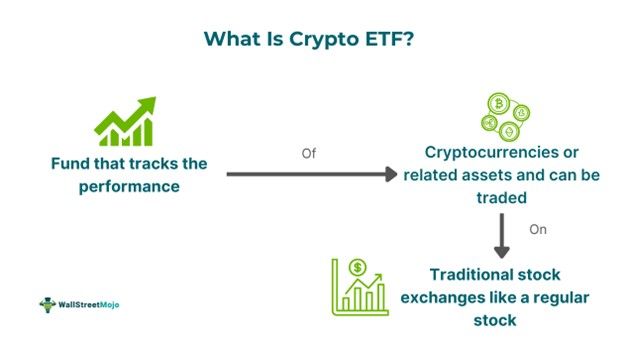Table Of Contents
What Is Crypto ETF?
A crypto ETF, or cryptocurrency exchange-traded fund, is a type of ETF in which investors can access diversified portfolios of digital tokens or coins. It is similar to traditional ETFs traded on exchanges such as the Nasdaq Stock Market and the New York Stock Exchange (NYSE).

Diversifying an investor's portfolio is undoubtedly one of the most important reasons for investing in cryptocurrency ETFs. Investors can access several crypto assets, in particular, outside of traditional securities markets. However, the infrastructure needed to acquire and trade cryptocurrencies has yet to be fully established or wildly popular due to the involved risk factors.
Key Takeaways
- A crypto ETF, or cryptocurrency exchange-traded fund, allows investors to access a diversified portfolio of digital tokens or coins.
- It operates similarly to a traditional ETF and is traded on stock exchanges like regular shares.
- Investors purchase shares, representing their ownership in the fund, providing them with indirect exposure to the price fluctuations of the underlying cryptocurrency.
How Does Crypto ETF Work?
A cryptocurrency ETF is an Exchange-Traded Fund that monitors changes in the value of one or more virtual currencies. It functions fundamentally like a conventional ETF and is traded like a typical share on a stock exchange. In other words, a crypto ETF will allow retail investors to invest in a security that complies with regulations.
Traditional ETFs have fund providers who own the stocks or commodities that will be tracked. Investors can buy shares from these. Similarly, the entity administering the funds and supplying cryptocurrency ETFs must possess the underlying assets, which could be a digital token or coin that it intends to monitor. Potential investors have access to the fund and can purchase it. After that, shares are granted as ownership of these tokens. Investors immediately own the tokens by owning the fund's shares.
There are deviations to this. For instance, Bitcoin Exchange Traded Funds are the widely used cryptocurrency ETFs. However, US-based Bitcoin ETFs (such as Bitcoin Investment Trust) do not own the cryptocurrency. Instead, they have stock portfolios that are exposed to the underlying blockchain technology. Blockchain ETFs are another option that uses this technology to offer investors access to cryptocurrencies. A typical management fee for crypto ETFs stands at roughly 2%.
For those exploring both crypto and stock investments with a user-friendly interface, eToro provides a unified platform. Some investors prefer platforms it for combining social trading with crypto exposure.
How To Buy?
Investors' options for cryptocurrency ETFs are currently limited. Several countries have not yet decided their position on cryptocurrencies, and cryptocurrency ETFs aren't even considered in many parts of the world. However, different platforms offer various services in the few places where cryptocurrency applications have been accepted.
U.S.-based investors do not currently have access to ETF alternatives that invest directly in cryptocurrencies. Any attempts at an ETF that owns bitcoin directly have yet to receive approval from the SEC (the Securities and Exchange Commission). Currently, the only assets that Bitcoin ETFs can hold are Bitcoin futures contracts, shares of businesses, and other ETFs that have exposure to cryptocurrencies. The same holds for smaller altcoins and other cryptocurrencies like Ethereum.
However, those who want to be involved can open a brokerage account as the first step in buying a Bitcoin ETF. After creating an account, an investor can buy Bitcoin ETFs like any other share or ETF. An investor usually enters the desired number of shares, finds the ticker symbol on their brokerage interface, and presses the buy button. However, in contrast to ordinary stocks, ETFs include an annual fee ratio that is withdrawn from the investor's account.
Examples
Let's understand the concept with the help of some hypothetical and real-world examples.
Example #1
Imagine an investor named Sarah who wants to diversify her portfolio with cryptocurrency but is hesitant about directly purchasing Bitcoin due to its volatility and the complexities of using digital wallets. Instead, she invests in the Purpose Bitcoin Yield ETF, which offers exposure to Bitcoin through a traditional stock exchange, like buying shares of a company. This ETF employs a covered-call strategy, providing Sarah with monthly income while minimizing the risk of Bitcoin's price swings. Over time, Sarah receives steady yield payouts, even when Bitcoin's value fluctuates, allowing her to benefit from crypto's potential growth without directly holding the asset.
Example #2
Toronto-based Purpose Investments, known for launching the world's first Bitcoin exchange-traded fund (ETF), has unveiled three new crypto asset funds on the TSX. These funds allow investors to engage in cryptocurrencies like Bitcoin and Ethereum through traditional investment methods. Two of the funds, the Purpose Bitcoin Yield ETF and Purpose Ether Yield ETF, will use a covered-call strategy to generate monthly income for investors, offering a way to profit from the volatile crypto market. The third fund, the Purpose Crypto Opportunities ETF, broadens exposure beyond cryptocurrencies to companies and platforms within the crypto ecosystem, such as Nvidia and Coinbase.
Although cryptocurrencies have faced criticism for their environmental impact and associations with illegal activities, Purpose CEO Som Seif remains optimistic about their future. He highlights the potential for high yields from the new ETFs, with projections of an 8% or higher return over time. However, the value of the funds remains tied to the unpredictable price swings of Bitcoin and Ethereum. Despite short-term volatility, many experts believe that increasing mainstream adoption of cryptocurrencies, facilitated by accessible investment vehicles like ETFs, will drive demand and push Bitcoin's value even higher in the future.
Top Crypto ETFs
According to Forbes, the following are considered the best crypto ETFs (2023):
- ProShares Bitcoin Strategy ETF (BITO) is a bitcoin futures contract with an asset management rate of $780 million.
- Valkyrie Bitcoin Strategy ETF (BTF) is a bitcoin futures contract with an asset management rate of $25 million.
- VanEck Bitcoin Strategy ETF (XBTF) is a bitcoin futures contract with an asset management rate of $29 million.
- AdvisorShares Managed Bitcoin Strategy ETF (CRYP) is a bitcoin futures contract with an asset management rate of $252,000.
- Global X Blockchain & Bitcoin Strategy ETF (BITS) is a Bitcoin futures contract with an asset management rate of $10 million.
- ProShares Short Bitcoin ETF (BITI) is a Bitcoin futures contract with an asset management rate of $111 million.
Irrespective of whether they are listed as the best crypto ETFs or not, investors have to be cautious when dealing with high-risk investments.
Disclosure: This article contains affiliate links. If you sign up through these links, we may earn a small commission at no extra cost to you.

